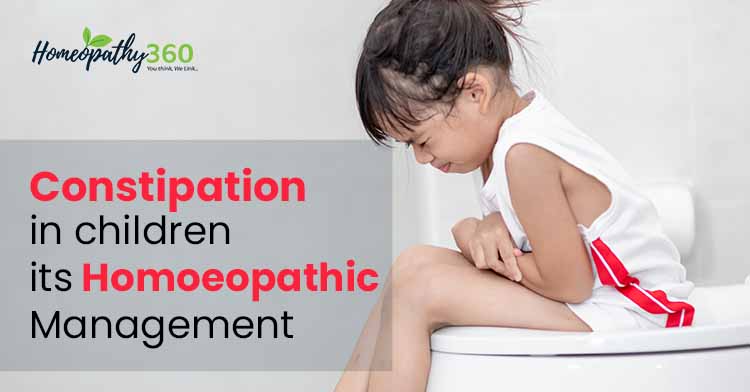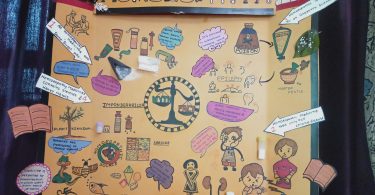
Introduction: Constipation is defined as delay or inability to completely evacuate the bowels or passing very hard stool, present for 2 or more weeks and sufficient to cause significant distress to the patient. Nowadays it is increasingly being recognized as a very common problem in children; generally 1 in every 20 visits in paediatric clinic there is a case of constipation.
The pattern and frequency of defecation depend on child’s age. During neonatal period and early infancy bowel movement can present more than four times a day eventually decreasing 1-2 times per day at 4 years of age. Toddlers usually have achieved voluntary control of their sphincter, a stool frequency of <2 times/ week is considered abnormal for all ages. The majority of patients have functional constipation; organic constipation is rare.
Epidemiology: Constipation can occurs in any age group starting from newborn to older. Overall it is seen more commonly in females than in males, also dark skinned people has been reported to have a 30% higher prevalence than the white population.
Different Children poop different amounts and number of times each day. It is an important milestone in the life of a child is learning to poop in toilet.
Most important aspect of stool of a person is the softness of the stool, for that Bistrol stool chart is widely used as research tool to describe the shapes and types of stools, also evaluate the conditions like constipation, diarrhea and irritable bowel syndrome.
Paediatric Bristol Stool Form Scale for
Children:

The goal is to pass stool type 3 or type 4 on the scale.
Types of Constipation: there are mainly two types of constipation
- Organic constipation: Painful passage of stool because of an underlying disease, it is a rare cause of constipation.
- Functional Constipation: Constipation due to fecal withholding behaviors, when all organic causes have been considered.
Causes of Constipation:
Functional (non organic):
The stool become hard and cause pain on passage which leads to association of defecation with pain and withholding, the main causes of functional constipation include-
- Acute illness
- Change in diet
- Forceful toilet training
- Unclean public toilet
.
Organic Constipation:
- Anatomical causes: include anal Stenosis or Atresia, anteriorly displaced anus, intestinal stricture, anal stricture.
- Abnormal musculature: Prune belly syndrome, Gastroschisis, down syndrome, muscular dystrophy.
- Intestinal nerve abnormality: Hirschsprung disease, pseudo obstruction, intestinal neuronal dysplasia, spinal cord defect, Spina bifida.
- Medication: like anti cholinergics, Narcotics, anti-depressant
- Metabolic and endocrine causes like Hypokalemia, Hypercalcaemia, Hypothyroidism, Diabetes mellitus, Diabetes insipidus
- Other causes include celiac disease, cystic fibrosis, cow milk protein allergy, Irritable bowel syndrome, Scleroderma.
Risk Factors:
- Sedentary lifestyle
- Not getting enough fiber in diet
- Not having enough water
- Certain medication( like antidepressant, calcium channel blockers, iron supplement, anticholinergics)
- Neurological disorder
Child May delay or avoid bowel movement because:
- Feels stressed about bowel movement
- Feels embarrassed to use a public bathroom
- Doesn’t want to interrupt play time
- Fears having painful or unpleasant bowel movement.
Management:
- Diet :A nutritious diet contains higher fiber, starchy food like potatoes, rice, bread, dairy products or dairy alternatives, beans, pulses, fish, eggs, meat and other proteins; eating a variety of fruit and vegetables every day, a balanced meal helps provide the body with all the nutrients it needs to normal growth and repair. Increasing dietary fiber intake is a healthy option for softer stool.
- Hydration: Drinking plenty of fluid or water helps to soften stool makes easier to pass, as in dehydrated state of body it takes water from the gut & send it to other important organs like heart.
- Dietary fibers available in Indian food:
- Whole grains
- Brown rice
- Potato
- Sweet potato
- Lentils
- Green peas
- Soybean
- Chickpeas
- Guava
- Apple
- Banana
- Pears
- Dried fruit
- Nuts
- Beans
- Broccoli
Prevention:
- High fiber rich food intake
- Drink plenty of water
- Promote physical activity
- Create toilet routine
- Remind to head nature’s call
- Supportive parents
Homeopathic Medicines for Constipation In children:
- Mag Mur: Constipation In Children during dentition only passing a small quantity stool knotty like sheep’s dung, crumbling at the verge of anus.
- Alumina: Hard knotty stool, no desire, rectum sore, dry, inflamed, bleeding, itching and burning in anus, even a soft stool passed with difficulty, great straining, constipation in infants, from artificial food, bottle fed babies; evacuation preceded by painful urging long before stool, then straining at stool.
- Psorinum: Hard, difficult stool, with blood from the rectum, constipation in infants, in pale, scrofulous children.
- Paraffinum: Frequent desire for stool, obstinate constipation in children, chronic constipation with haemorrhoids and continuous urging to stool, without result.
- Alumen: Constipation of the most aggravated kind, no desire for stool for days, violent ineffectual urging to stool, no ability to expel to stools, Marble like masses pass, but rectum still feels full, itching in anus after stool, long lasting pain and smarting after stool .
- Opium: obstinate constipation, no desire to go to stool, round hard black balls, feces protrude and recede, spasmodic retention of feces in small intestine, stool involuntary, black, offensive, frothy, violent pains in the rectum, as if pressure asunder.
- Silicea: Rectum feels paralyzed, painful spasm of sphincter, stool comes down with difficulty, when partly expelled recedes again, great straining, rectum stings closes on stool, feces remain a long time in rectum.
- Bryonia: constipation stool hard, dry as if burn; seem too large, stool brown thick bloody worse in the morning, from moving in hot weather, after being heated, from cold drinks, every spell of hot weather.
- Plumbum met: Constipation; stools hard, lumpy, black with urging and spasms in the anus. Obstructed evacuation from impaction of feces, neuralgia of rectum, anus drawn up with constriction.
References:
- https://www.healthychildren.org
- Boericke W;New Manual Of Homeopathic Materia Medica& Repertory with Relationship of Remedies( English Handcover, Boericke William MD)
- https://www.mayoclinic.org
- Ghai Essential Pediatrics (ninth edition)





